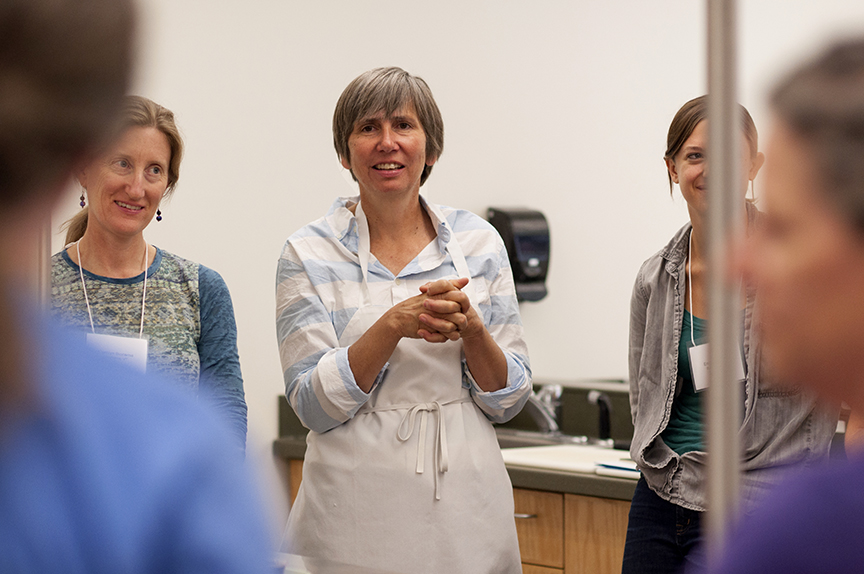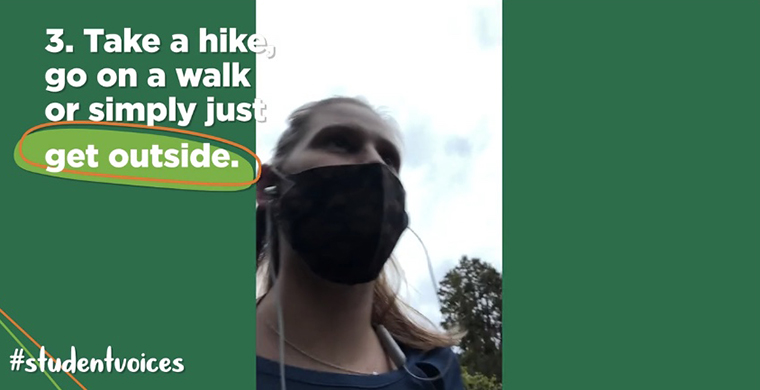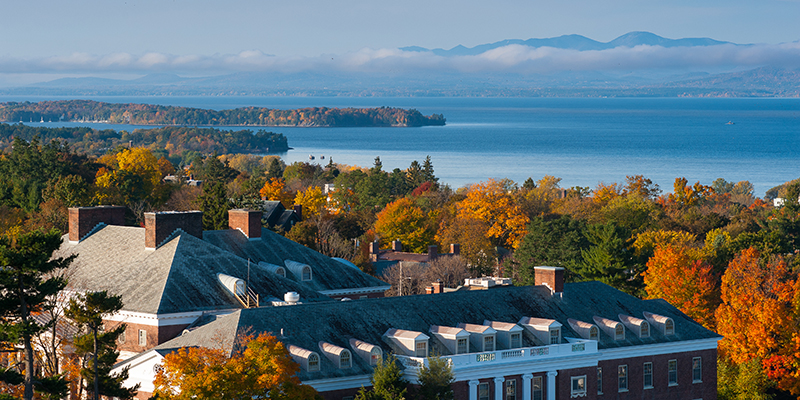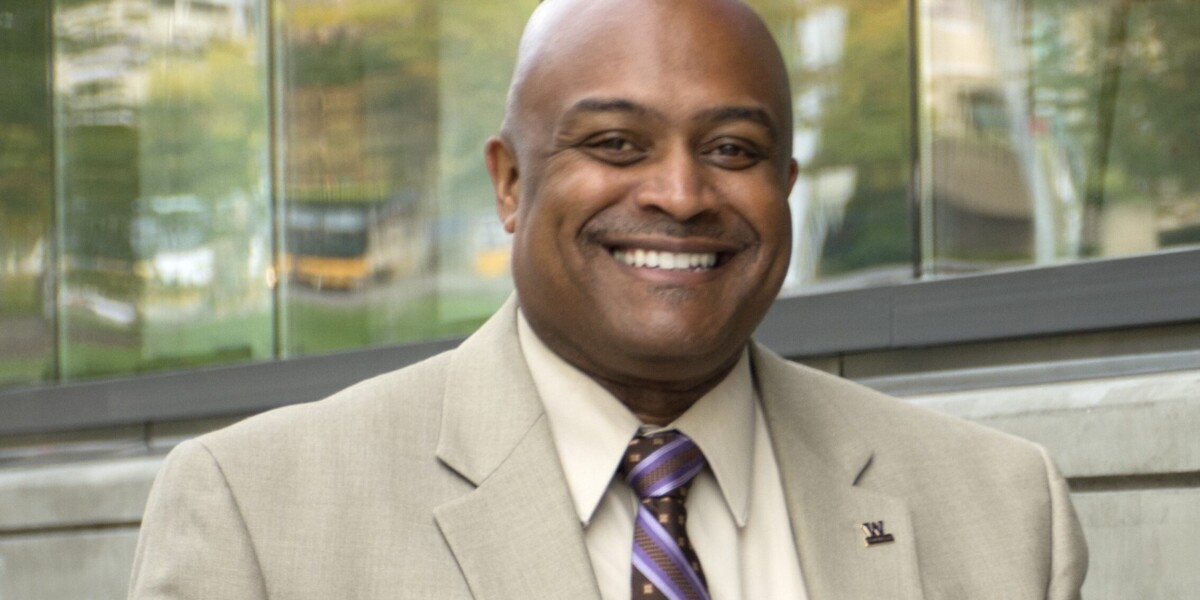Food is a fundamental source of meaning and value in human life. For scholar Lisa Heldke, food is also the quintessential liberal arts topic.
Heldke co-teaches the UVM John Dewey Kitchen Institute with Continuing and Distance Education Dean Cynthia Belliveau every June. In the program, they emphasize the pedagogical power of the kitchen and how to use cooking to teach any topic within a frame of collaboration and cooperation.
Dewey, a noted a philosopher and educator, who was born in Burlington and earned his undergraduate degree from UVM in 1879, believed that food was a central vehicle for teaching critical, intuitive thinking, and unifying knowledge with experience. His main approach to teaching was “learning by doing.”
Much of Heldke’s scholarly work is devoted to the explication and exploration of the philosophical significance of food, food making, and agriculture. She teaches in the philosophy department and the Gender, Women, Sexuality Studies Program at Gustavus Adolphus College in Minnesota.
She says that if you look at any discipline, and it won’t take long to find food-related topics at the heart of that discipline. Heldke says food is often hiding in plain sight in many courses, from sociology and art to math and biology.
We talked to Heldke about Dewey’s approach and the power of cooking to learn.
How does John Dewey fit into the study of food?
Dewey used the kitchen in the elementary school classroom as one of the ways to invite children into inquiry about their world. The John Dewey Kitchen Institute extends that understanding to the adult world. This isn’t a case of “theory-then-practice.” We don’t “theorize” and then go into the kitchen to “make things.” Inquiry happens in and through the activity of making food. Dewey says theory and practice are really just two forms of practice–slower and faster forms. We try to make good on that way of thinking in the Institute.
What kind of inquiry is happening at the Institute?
There are moments of intense activity as you try to get your recipe completed on time, and there are moments of idleness when you muse on things with your kitchen mates. All of this is inquiry. It all works together in ways that are really inseparable. You can’t have the flurry without the reflection.
What do you think draws students to the Institute?
Sometimes it’s a love of Dewey and other times it’s the desire to do something experiential in their courses, and a sense that this looks like an interesting “something.” Sometimes it’s a real passion for food and food studies. Occasionally, someone participates who is already a dedicated teacher of food studies topics.
This year, we had a number of folks who were educators about food in community settings, and they took the class to think more about how to teach about food in integrative ways. In other words, sometimes it’s the desire to learn more about how to teach with food. Sometimes it’s the desire to learn how to do one’s “food teaching” differently.
What kinds of foods do students learn about and prepare?
We emphasize that the Institute is not about learning to cook, but cooking to learn. So, what they cook is, in a sense, a little beside the point. We do some familiar things—like cutting an onion—in ways that are perhaps unfamiliar. Students learn to make pie crust and they make a quiche. They experiment with making food that embodies theoretical concepts they’re exploring.
We also ask students to design and execute a dish or dishes that illustrate one of the essential Deweyan tenets of teaching and learning. It’s great to listen to them puzzle out what they will do with the ingredients they acquire, and to turn it into a dish in a way that illustrates a concept. It requires them to think about the symbolic importance of food in a whole new way.
What do you enjoy most about teaching at the Kitchen Institute?
It’s three days of geeking out on Dewey in the kitchen with Cynthia, who’s as much of a John Dewey geek as I am! Really, it’s a dream gig. I’ve never had the opportunity to work with someone who so deeply shares both my admiration of Dewey and my understanding of how he works in the kitchen. The fact that I get to learn from Cynthia—who wrote her dissertation on this stuff—is just incredible.
How do students in the program inspire you?
Because they are all so different and come from such different work environments, I am continually challenged to think about how to make the program useful for them.
That’s really in the spirit of Dewey—he challenges the educator to begin where students are, and then nudge them down the road by asking them hard questions. So, I love the opportunity to be challenged by them so that I can, in turn, challenge them.
It’s never boring and I never feel like I know what’s going on. It’s some of the most high-wire teaching I do. We’re very matter of fact with students about this as we tell them that our job is to be inquirers alongside them.
What are your favorite things to cook?
I’m a passionate bread baker. With friends, I’ve built a mortar-less brick oven at my summer place in Maine and a mud oven in Minnesota. In my dreams, I am a truly skilled artisanal baker. In reality, I turn out a pretty decent loaf of Jeffrey Hamelman’s sourdough seed bread.
Learn more about the John Dewey Kitchen Institute.
-Our “UVM Is” series celebrates University faculty, educators, and the campus community.
To learn more, visit UVM Continuing and Distance Education at learn.uvm.edu.




